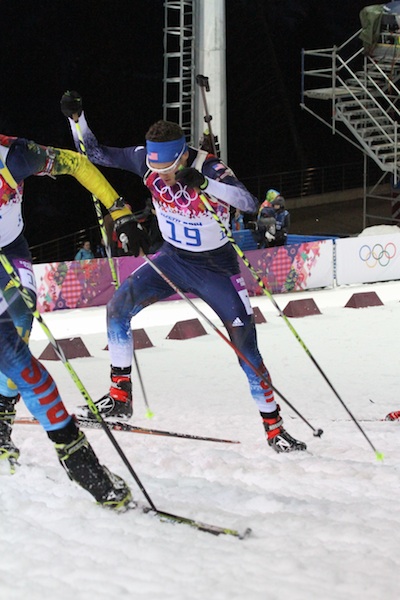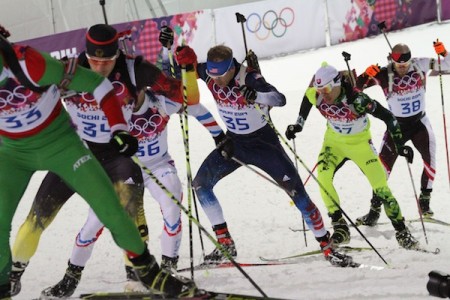
FasterSkier’s coverage is made possible through the generous support of Rudy Project.
SOCHI, Russia — For top U.S. biathletes Tim Burke and Lowell Bailey, Monday’s Olympic pursuit race was one to forget about as quickly as possible.
For both men, the race wasn’t a total disaster: Burke finished 22nd in the 59-man field, with two misses over 20 shots, while Bailey was 38th, with three misses.
But their expectations were so high headed into the games that the mediocre results were devastating. Burke had little to say at the finish, beyond the fact that he was “really empty right from the start,” “really disappointed,” and that the race was “really, really tough.”
Bailey was even more distraught, listening to a reporter’s first question before responding, “I can’t,” and walking away.
“I couldn’t speak after the race. First time that’s ever happened to me. Just couldn’t give a single interview,” he said in an email afterwards. “I felt heavy right out of the gate today. I have no idea why. Just one of those days.”
(He also added in a tweet: “Even when you have a bad day, mom still loves you.”)
U.S. Head Coach Per Nilsson said he’s giving Burke and Bailey a little time to think about the results, before a meeting with them that he scheduled on Tuesday.
“They get 12 hours to digest it,” he said in a phone interview after the race. “Then, we go for the next one.”
He stressed that both men are still in decent shape, despite their comments about feeling flat: Bailey’s time on the course was 55 seconds behind Sweden’s Fredrik Lindstroem, who had the top ranked time of the day over 12.5 kilometers. Burke was not much worse—just a minute and eight seconds back.
“That’s nothing,” Nilsson said. “If they have a race with bad feelings, they are still less than one minute behind the best skier in the field. They are more negative than they should be.”
“You know athletes—they exaggerate a little bit,” he added.
Nilsson also said he thought the Americans had a hard time on the soft, sloppy snow on the race course, which had baked all day under the high Sochi sun.
By the time the men started their race, at 7 p.m., the track was a mess of inches-deep slush, which Burke described as “super slow, tough going for everyone.”

Nilsson said the ski technique the Americans strive towards—which he described as “patient” and “really secure”—is better suited to firmer trails, and may have left Burke and Bailey wallowing in Monday’s deep snow.
Nilsson compared their technique to that of Czech biathlete Ondrej Moravec, Tuesday’s silver medalist, whom he said was taking big steps over the snow.
“Like it is now, you need to ski a little different. You need to be light and gain a little bit of ground,” Nilsson said. “Even if they’re at the Olympics, we should not be afraid to adapt to new snow conditions.”
That’s especially true because temperatures aren’t expected to cool much over the next few days, and officials have said they’re not inclined to salt the course to help it freeze back up.
The next men’s race at the Olympics is Thursday—the 20 kilometer individual competition.
Despite Burke’s and Bailey’s frustrations, Nilsson seemed confident that the two men would come around in time—and he maintained that the margin between their middling performances Monday and a solid result later in the games is really not that all that large.
“They have their levels,” Nilsson said. “We must show them, then, that it’s not so bad as it looks like in the results list.”
Nathaniel Herz
Nat Herz is an Alaska-based journalist who moonlights for FasterSkier as an occasional reporter and podcast host. He was FasterSkier's full-time reporter in 2010 and 2011.



